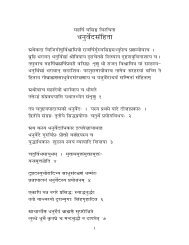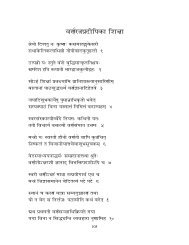Create successful ePaper yourself
Turn your PDF publications into a flip-book with our unique Google optimized e-Paper software.
SS¸DH JX>(! VY( 5! SX¥DH \6\ WX GL7¥P! V KUHW #Y WL².Z V¾D»DH $3\1\JDH¥W!<br />
9.141. Of the man who has an adopted (Datrima) son possessing all good qualities, that same (son) shall take<br />
the inheritance, though brought from another family.<br />
JDH¥ LU.ZH MQL\WXU{ Q KUHG{ GL7¥P! .Y LFW JDH¥ LU.ZDQXJ! LS^IDH 9\S(LW GGW! 6Y[D<br />
9.142. An adopted son shall never take the family (name) and the estate of his natural father; the funeral cake<br />
follows the family (name) and the estate, the funeral offerings of him who gives (his son in adoption) cease (as<br />
far as that son is concerned).<br />
$LQ\X‹DVXW] F #Y SXL¥^\D $»] F GHYUDW D( WD( Q $K5WDH DJ MDUMDWN NDPMD(<br />
9.143. The son of a wife, not appointed (to have issue by another), and he whom (an appointed female, already)<br />
the mother of a son, bears to her brother-in-law, are both unworthy of a share, (one being) the son of an<br />
adulterer and (the other) produced through (mere) lust.<br />
LQ\X‹D\DP $LS SXPDQ QD\D MDWDH $LY[DQW! Q #Y $K5! S(WN LU.Z SLWW 7SDLGWDH LK V!<br />
9.144. Even the male (child) of a female (duly) appointed, not begotten according to the rule (given above), is<br />
unworthy of the paternal estate; for he was procreated by an outcast.<br />
KUHW W¥ LQ\X‹D\D MDW! SX¥DH \ZD $UV! @HL¥N6\ WX WG{ E,M [P5W! ¾VY] F V!<br />
9.145. A son (legally) begotten on such an appointed female shall inherit like a legitimate son of the body; for<br />
that seed and the produce belong, according to the law, to the owner of the soil.<br />
[Q \DH LE \DG{ ÄDWXU{ PW6\ LÒ\P #Y F VDH $S7\ ÄDWXU{ 7SD G DW W6\ #Y WQP<br />
9.146. He who takes care of his deceased brother’s estate and of his widow, shall, after raising up a son for his<br />
brother, give that property even to that (son).<br />
\D LQ\X‹D $1\W! SX¥ GHYUDG{ YD $3\YD½X\DW W NDPMP $LU.Z,\ YZD 7S¸ ¾F@WH<br />
9.147. If a woman (duly) appointed bears a son to her brother-in-law or to another (Sapinda), that (son, if he is)<br />
begotten through desire, they declare (to be) incapable of inheriting and to be produced in vain.<br />
#WG{ LY[DQ LY`H\ LY DJ6\ #N\DHLQ X EÜ, X F #NMDWDQD QDQDÒ, X LQEDH[W<br />
9.148. The rules (given above) must be understood (to apply) to a distribution among sons of women of the<br />
same (caste); hear (now the law) concerning those begotten by one man on many wives of different (castes).<br />
ÂDÚ>6\ $QXS89\H5><br />
FWÔV WX \LG LÒ\! WDVD SX¥H X MDWH X LY DJH $\ LYL[! 6PW!<br />
9.149. If there be four wives of a Brahmana in the direct order of the castes, the rule for the division (of the<br />
estate) among the sons born of them is as follows:<br />
N,QD]DH JDHY DH \DQP $ODU] F YH=P F LY¾6\ $DLUN GH\P #ND]] F ¾[DQW!<br />
9.150. The (slave) who tills (the field), the bull kept for impregnating cows, the vehicle, the ornaments, and the<br />
house shall be given as an additional portion to the Brahmana (son), and one most excellent share.


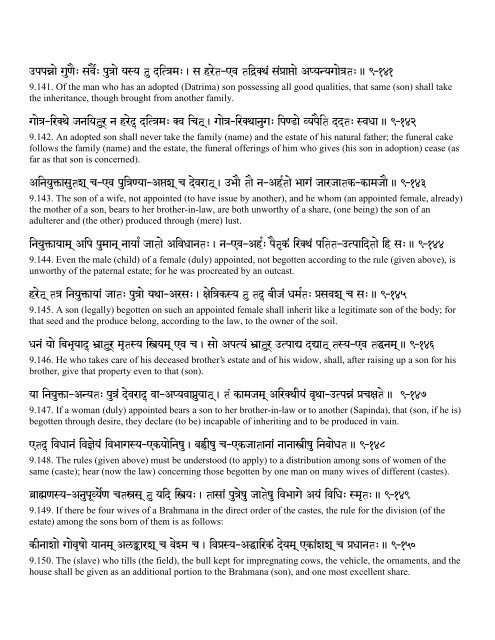
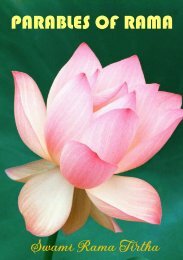
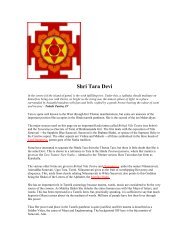
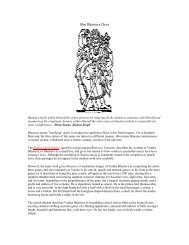
![[ Home ] [ Up ] Books Contact us Immortal Promise ... - Hindu Online](https://img.yumpu.com/9577792/1/190x245/-home-up-books-contact-us-immortal-promise-hindu-online.jpg?quality=85)
